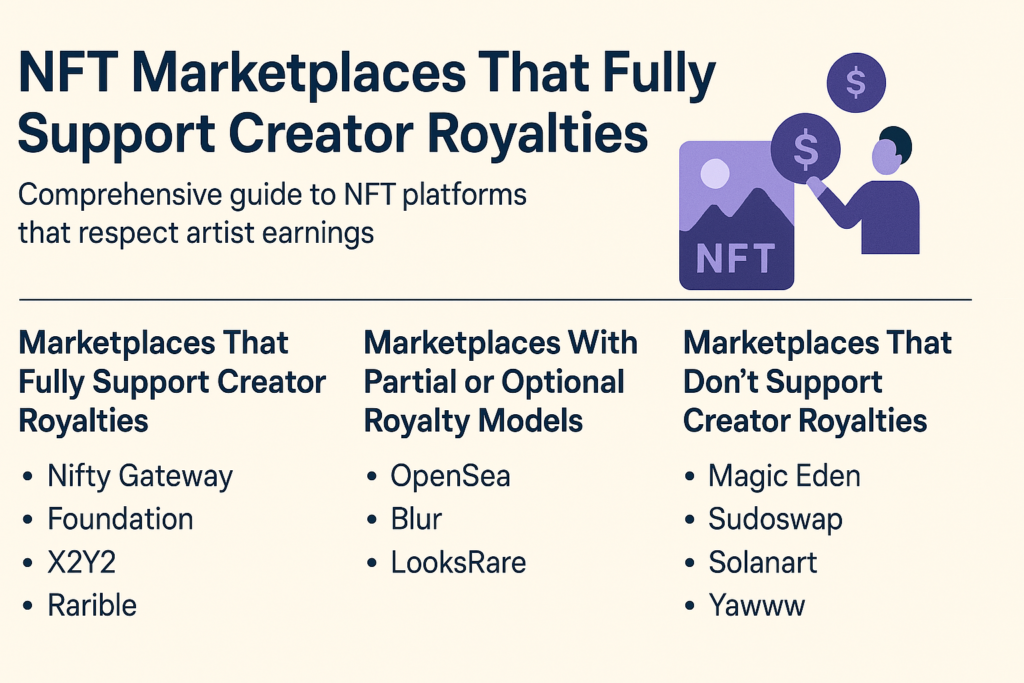
Introduction
As blockchain technology redefine the digital site, NFTs (Non-Fungible Tokens) have become a revolutionary force in the art world. Artists, musicians, game developers, and other creators now have the opportunity to monetize their digital assets directly and nonstop—thanks to a brand-new feature known as NFT creator royalties.
But while the possible for passive income is enormous, not all NFT marketplaces are equally committee to enforce royalty payments. As a result, creators must choose platform wisely to ensure they are fairly compensate for their work.
What Are NFT Creator Royalties?
NFT creator royalties refer to a percentage of proceeds automatically paid to the original creator every time their NFT is resold in the secondary market. These royalties are often coded into the smart contract , ensure that artists earn passive income over time.
For example, if an artist sets a 10% royalty on an NFT and it is resold for 1 ETH, the artist receives 0.1 ETH from that transaction—forever, as long as royalties are respect by the platform.
This system marks a dramatic shift from traditional art markets, where artists typically earn only once from the start sale.
Top NFT Marketplaces That Fully Support Creator Royalties
1. Nifty Gateway
Nifty Gateway is a premier NFT platform, widely known for host high-end digital art drops and partnership with iconic brands. It not only enforces royalties at the platform level but also respects on-chain royalty rules set by creators.
- Royalty enforcement: Platform-level and on-chain
- Best for: Establish artists and premium collectors
Nifty Gateway believes that secondary sales royalties are a core value proposition and thus ensures creators get paid—no exceptions.
2. Foundation
Launched in 2022, Foundation is an exclusive, invitation-only NFT marketplace focus on art and creativity. It empowers artists with a strong royalty model:
- Creator royalties: 10% on all secondary sales
- Marketplace fee: 5%
- Best for: Professional artists and digital illustrators
Despite charge higher marketplace fees, Foundation ensures long-term profitability for creators.
3. X2Y2
Initially, X2Y2 did not support royalties when it launch in early 2022. However, the platform fast shift its policy due to community feedback and now offer full royalty support.
- Creator control: Yes, creators set royalties
- Blockchain: Ethereum
- Best for: NFT traders and community value creator rewards
X2Y2 now active encourage royalty support and promotes compliance across collections.
4. Rarible
A veteran in the NFT space since 2019, Rarible is built on the Ethereum blockchain and is known for its open and community-driven model.
- Supports on-chain royalties: Yes
- Custom royalty settings: Yes
- Decentralized governance: RARI token voting
Rarible is an excellent platform for artists who want to retain control over how their NFTs are sold and monetize.
NFT Marketplaces With Partial or Optional Royalty Models
1. OpenSea
As the largest NFT marketplace, OpenSea has a complex relationship with royalties. While it original apply them, it has since introduce optional royalties for older collection. However, newer collection can utilize enforceable royalty contracts.
- Minimum royalty (if not enforced): 0.5%
- Custom enforceable model: Available
- Best for: Large-scale NFT projects
Although not perfect, OpenSea continues to evolve in response to creator demands.
2. Blur
Launched in late 2022, Blur is an Ethereum-based NFT marketplace known for being trader-friendly and highly efficient. It supports optional royalties with a minimum threshold of 0.5% for immutable collections.
- Speed & flexibility: Key features
- Royalty support: Partial, depend on collection structure
Blur is often ideal by professional traders who want a fast UI with reasonable creator support.
3. LooksRare
A strong competitor to OpenSea, LooksRare made waves in early 2022 with a user-reward model. While it has move to buyer-select royalties, the platform commits 25% of protocol fees back to creators.
Although not perfect, OpenSea continues to evolve in response to creator demands.
NFT Marketplaces That Don’t Support Creator Royalties
Several platforms have chosen to eliminate enforced royalty altogether, often to attract collector seeking lower fees.
1. Magic Eden
Initially a royalty advocate, Magic Eden shifted to optional royalties across its platform. Buyers now choose the royalty percentage they’re willing to pay.
Creator earnings: Not guaranteed
Networks supported: Solana, Ethereum, Polygon
2. Sudoswap
Sudoswap is a spread out NFT marketplace that utilizes automated market maker (AMM) pools for NFT trading. It does not support creator royalties, back a minimal-fee, liquidity-based model.
- Best for: Instant trading
- Not ideal for: Artists reliant on royalties
3. Solanart
A once-popular Solana NFT marketplace, Solanart remove all creator fees to attract more volume. This decision essentially eliminate ongoing revenue for artists.
4. Yawww
Originally a peer-to-peer NFT lending platform, Yawww evolve into a marketplace. It allows buyers to choose how much (if any) royalties to pay, thereby put creators at a disadvantage.
Choosing the Right NFT Marketplace
As the NFT space continue to evolve, the importance of royalty-enforce platform become increase clear. For creators, royalties are more than a feature—they represent a shift in power and fairness in the digital economy.
When select a platform, artists should consider:
- Does it enforce royalties at the smart contract or platform level?
- What percentage does the creator earn from resales?
- Does the platform support spread out governance or central control?
Whether you’re minting your first NFT or manage a full collection, prioritize platforms that value your work long-term.
